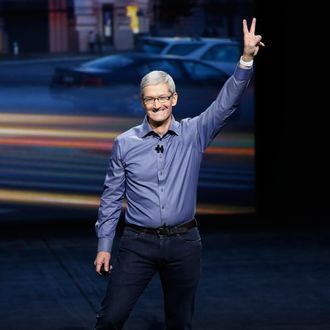
Apple CEO Tim Cook’s refusal to help the FBI access an encrypted phone is an important and unprecedented event in the long, strained relationship between Silicon Valley and the government. But there is one particular line, near the end of his letter, that sticks out: “We are challenging the FBI’s demands with the deepest respect for American democracy and a love of our country.” Quite frankly, that’s bullshit.
This is not to say that Apple’s refusal to comply is wrong. If we take Apple’s word that the order amounts to building a back door into its devices for the purposes of government investigation, to fight it is absolutely the right move — the government should not have, in Cook’s words, “a master key, capable of opening hundreds of millions of locks.”
Nor is it to say that Cook — or any one of Apple’s employees — doesn’t have a genuine commitment to privacy, security, and civil liberties. I don’t know the guy!
But Apple, the institution — Apple, the publicly traded corporation — is taking its stand not out of any moral obligation, but out of financial self-preservation. Remember: [extremely dorm-room voice] Apple’s goal is to maximize shareholder returns. Apple cares about American democracy only to the extent that the continued existence of American democracy affects its profit margins. It cares about you only to the extent that you are a current or future consumer of its products. Which is why it’s weird to read over-the-top praise of Apple’s stand:
What Apple really cares about, above all else, is its ability to continue to sell phones. If Apple went ahead and followed the judge’s orders, every iPhone or iPad it sold from then on would come with an asterisk: Law enforcement, if it so chose, even if you protected your phone with a passcode, could access the device. It would stain the company’s reputation for a long time. According to a Pew Research Center report from last month, “some 74% say it is ‘very important’ to them that they be in control of who can get information about them, and 65% say it is ‘very important’ to them to control what information is collected about them.”
This is a case of corporate and customer interests aligning against government snooping. Apple is not for the customer, it is for itself. The Apple that Tim Cook claims cares deeply about American citizens manufactures almost none of its products domestically, outsourcing most of its jobs to China. At a dinner at the White House, President Obama once asked Steve Jobs about the issue directly. His response was unequivocal: “Those jobs aren’t coming back.” Tim Cook might not be Steve Jobs reincarnate, but he was a protégé. Jobs and his management style have practically been deified by this point. His office in Cupertino has sat untouched since 2011.
The jobs that Apple does create in the United States are for its Apple Store employees, and most of them earn standard service-economy wages. The Wall Street Journal reported in 2012 that Apple Store workers were paid anywhere between $9 and $15 per hour, with Genius Bar technicians in the ballpark of $30. That would put a salesperson’s salary at about $30,000 per year, and double for a Genius Bar worker. In 2011, the New York Times calculated, “each Apple store employee — that includes non-sales staff like technicians and people stocking shelves — brought in $473,000.”
Similarly, Apple has a financial structure that allows it to stash money overseas rather than paying taxes in the United States. For years it used a scheme known as a Double Irish arrangement to avoid paying taxes. As the New York Times wrote in 2012, “Apple has created subsidiaries in low-tax places like Ireland, the Netherlands, Luxembourg and the British Virgin Islands — some little more than a letterbox or an anonymous office — that help cut the taxes it pays around the world.” A recent overview from Citizens for Tax Justice finds that Apple would owe the U.S. government nearly $60 billion if its profits were not held offshore. Addressing the issue last year, Cook told Charlie Rose, “There’s no truth behind it. Apple pays every tax dollar we owe.” That’s a semantic dodge — Apple has, put simply, structured itself to owe less.
So yes, Apple’s stand against the FBI is the right one. If you want to reward Apple for doing the right thing, buy its products. (As the programmer Alice Maz puts it, “‘major tech companies compete to be the most hostile toward government’ is like, gold standard of how markets should operate.”) But it’s also what we should expect. Don’t pat it on the back or excuse its other horrible behavior. This isn’t a case where a shining hero took on a powerful villain. It’s a case where two powerful villains fought, and the goals of one happen to be our goals, too. Make no mistake — Apple claiming to look out for American citizens and American democracy is a crock. Apple cares about precisely one thing: Its ability to sell you a phone.





























